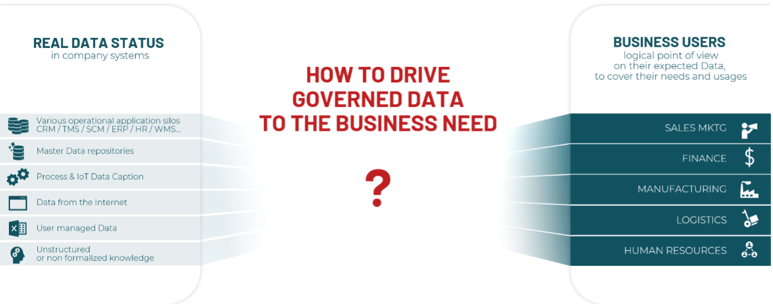by Charles Parat, Data Consulting Director
DATA INTELLIGENCE :
when we consider data to be an asset,
we organize ourselves to take care of it
and make qualified data available for all uses
Right away, let's put the term down: Data Intelligence is an objective to improve the company around the constitution and sharing of Data assets.

This is the project by which an organization will gradually and continuously make any data available to any business actor who may have a useful need.
Let's simplify again: Data Intelligence allows the control and provision of data; The purpose of Business Intelligence is to make business information available, even in its presentation best suited to its end user, the one who must make a decision.
In short, no effective Business Intelligence without Data Intelligence!
Since management and analysis force us to break down the silos of the company's different business areas, it means exposing data and what we know about them, to business players who may not have known it, but who could take advantage of it to improve their point of view.
As access and use must be controlled, it is also the way to put in place the controls of various compliance obligations, such as the very significant, and almost universal today, of the protection of personal data.
We mentioned this in the previous chapter; Process Intelligence has made it possible to observe on the one hand business uses and information needs based on events, and on the other hand company data supposed to represent the facts that must be used to produce this information.
Data Intelligence is therefore this business discipline that will consist in ensuring that the data needs of the business lines are covered by the technical data systems put in place.
We will have understood that everything here is driven by the notion of use. We do not build complex and expensive technical systems for the sake of technological innovation. So it is a question of putting the coverage of uses and business needs as a key objective of this intelligent Data construction!
If we talk about usage, we talk about business; If we talk about technical production system, we talk about IT. The essential challenge of Data Intelligence is therefore a sustainable and "good intelligence" co-production between business teams and IT teams.
To provide benchmarks, this Data Intelligence is based on 4 essential pillars: Data Governance, Data Architecture, Data Platform, Data Management.
Let's see what these concepts cover.
Data Governance
this is the organization through which the various actors of the company, business, IT and management, clearly divide the roles in the enrichment and provision of the Data heritage.
We set up a governance that corresponds to a Data strategy: that is to say, we have set objectives and we have defined the means we give ourselves to achieve them. So each company will have its own data governance, and it will vary over time under the influence of both internal and external factors (constraints, compliance, risks, means, ...).
The essence of this governance consists in mastering the company's data, that is to say, qualifying, understanding and organizing access. It is sometimes said to think "Data As A Service" to serve all the uses of data in the company.
Concretely, this governance must be "sponsored" at the highest level of the company and based on an orchestration cell that will animate and manage the Data project under the control of sponsors. This is the role of the so-called Data Office, which is headed by the CDO, Chief Data Officer.
Under his responsibility, the various business lines are often organized into Business Data Committees that bring together business users to describe the needs and uses of data. This makes it possible to improve and disseminate knowledge of the business value of the available Data. or plan to acquire new ones. These committees develop and monitor projects to improve their business sphere and organize information and training for the populations they represent.
The IT department will be keen to designate among its teams contributors to these reflections, able to enlighten the trades on the available data, the context of their obtaining, the known uses, and the precautions of use in new contexts. It is desirable that they participate in business committees.
The IT department will also contribute to the Data Office's reflections to provide the right level of information on the constraints of the systems and technologies in place, and help the Data Office to recommend the adoption of tools that will help the company document its projects and their progress. We are talking here mainly about the key functions of Business Glossary, Data Catalog, Data Lineage.
Management and Project Portfolio Management that will allow the Data Office and all contributors not to rely solely on office tools that show their limits too quickly (Excel in particular).
Refusing to equip oneself with these tools quickly leads to the extinction of a governance dynamic, by making collaborative documentation and validation tasks unbearable on a daily basis.
Data Architecture :
this is the logical vision of the organization of data systems from their capture to business use. It is a question of defining what it is preferable to propose as data provision systems most in accordance with the requirements and uses of the professions. Source systems provide direct information according to planned application developments, and in relation to their processing capacity, but many uses require massive processing on this data or consolidations with other sources that require to think of intermediate systems before their availability to business applications such as Business Intelligence. This is where businesses hear about DataMart, Datawarehouse, DataLake and data transport and processing principles, such as ETL or ELTs that fulfill in different orders the functionalities of Extraction, Loading and Transformation of data in Data Management chains.
Data Management :
this is the organization of data flows and the description of the conditions of extraction, transformation and storage of data between storage and capture systems. It is at this level that technical processes and data quality implementation tools (DQM, MDM,...) come into account, taking into account the needs of supervision of the quality of production of treatments. It is essential that these tools make it possible to capture the different levels of metadata that concern the flows: the design information that governs them, the technical information that transposes them into an execution chain, the production information that documents their freshness, quality and integrity.
Data Platforms :
this is all the components of infrastructure, software and services that complement each other to "motorize" the data value chain: from source data from transactional applications or external data providers or manual entries or extraction that arrive in the form of files, ... until the consumption of the information that is made by the tools for presenting and disseminating information.
The current strong trend is to transpose B.I. architectures into cloud services or to develop a hybridization of technical services between cloud components and others on premise, or even between several clouds. The expected gains vary from a new business model, or even the expectation of a form of economy, to the attraction of a solution available at any time from anywhere, with solutions for continuous improvement of platforms thanks to the upgrades in the course of time.
Suggested reading :
Business Intelligence in 3 steps
Process Intelligence : understand how data flows
Data Glossary : let's clear things up




